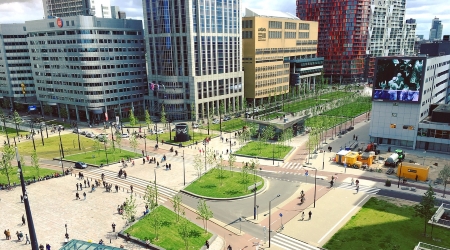In 2013 the Israeli government passed a law that enables the establishment of local municipality clusters in the periphery. It is based on the assumption that there are no growth mechanisms in the periphery, and therefore, the only way to provide services to citizens is through increasing efficiency.
The local sustainable economy is being measured differently from gross domestic products (GDP), in the way it looks beyond the financial bottom line – not just how much money passed through, or income versus spending – but also what the money did for this particular local community and what was the quality of the usage of the money for the population and the local businesses.
Jumpstarting the periphery needs to be based upon a strategy of inclusive growth- through identifying the unique assets and nurturing clusters that include local authorities, large businesses and small businesses, entrepreneurs, research and training institutions, non-profits, different activities and philanthropy to create a network of knowledge and innovation, that will promote the social, personal, and economic wealth.
This vision will be realized by nurturing local growth mechanisms and capacity building to promote LSE and creating partnerships in the urban leadership – in the municipality, the community institutions and the businesses.
Therefore, we need the organizing of several organizations and institutions in a defined space such as a local municipality, the private sector and civil society organizations. This organized body needs basic national inputs (such as investment in infrastructure), but also depended on the identification of the unique assets to the area and energizing the economic activity around them. an economic cluster based on the unique assets is an economic structure that allows for the elevation of the area.
An important question is what you measure and how you define success. Part of the goals of this project is to change the point of view through which the municipality measures the activity with the businesses and the residents – and to implement values of participatory governance, sustainable development and emphasizing locality.

Growth During COVID-19:
Promoting Local Economies as a Response to the Economic and Public Health Crises
The COVID-19 crisis has made the central importance of local businesses abundantly clear. On the one hand, local neighborhood businesses, close to home, have become essential in times of lockdown, and on the other, with the rise of the economic crisis they have become a critical ingredient in reaching social and economic rejuvenation and flourishing.
In order to promote this area in a meaningful way, cooperation is necessary between government ministries, and different sectors. These include the ministries that deal with the issue directly such as the Ministry of the Economy, via the Agency for Small Businesses, and the branches of Ma’of; the Ministry of the Interior and Enterprise 265, the Ministries of Health and Agriculture, the Planning Authority, and more.
In an attempt to provide a response to the severe economic crisis that we are in the beginning stages of, we are establishing an inter-sectoral collaboration, consisting of local authorities, civil society organizations, and consultants. In order to promote the field, and focus the efforts on the broad advancement of local economy, that takes into account all the different parameters, resources must be invested in regulatory issues, planning and physical infrastructure.
The Ministry of the Economy which administers this area is the natural leading partner to this initiative, and we are working on creating a partnership.
Here are several programmatic directions that we would like to submit to develop:
- Creating inter-ministerial collaboration designed to promote the field, including:
- A round-table to address obstacles and exploit opportunities
- Regulatory changes
- Promoting technological solutions that can make it easier for small businesses to meet the regulatory demands.
- Defining agreed-upon objectives and strategy for the development of the local economy in Israel as the basis for developing a sustainable economy. The Ministry of the Economy would ideally take the lead in making a flourishing local economy the central pillar of a sustainable economy.
- Training and professional knowledge development of officials in the local and national governments, including skills relating to local economy, regulatory obstacles, and the possibilities inherent in hosting conferences, seminars, workshops and courses.
- Establishing a digital platform to centralize all the existing knowledge and experience in this area: an index of tools for the development of local economies, best practices in the area from Israel and the rest of the world, a mapping of relevant areas, planning, local resilience, and more.
In these crucial times, there is a need for government leadership to promote a coordinated broad initiative of all the stake holders in the government, the local authorities, the small business sector, and civil society organizations.
